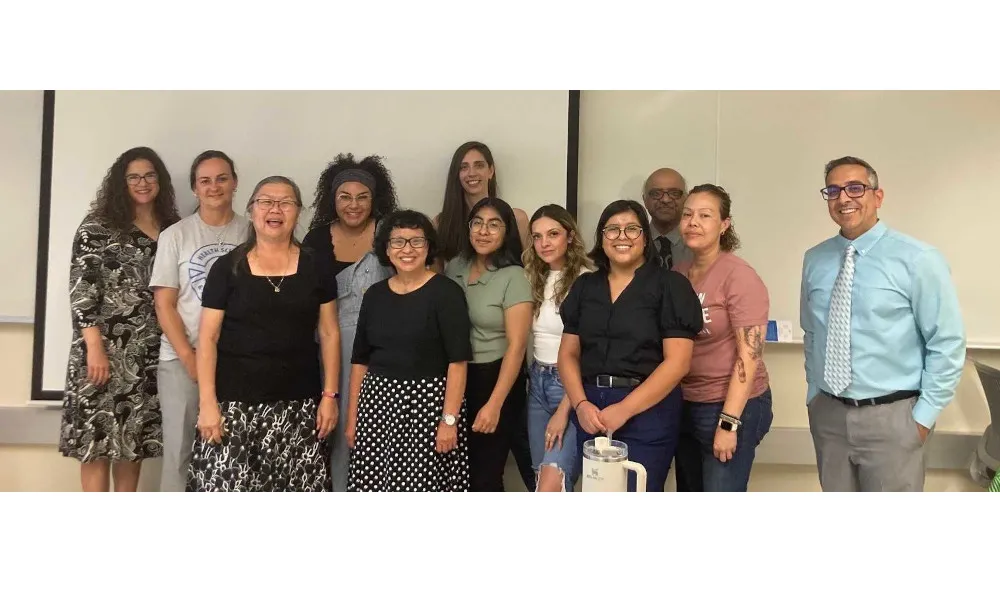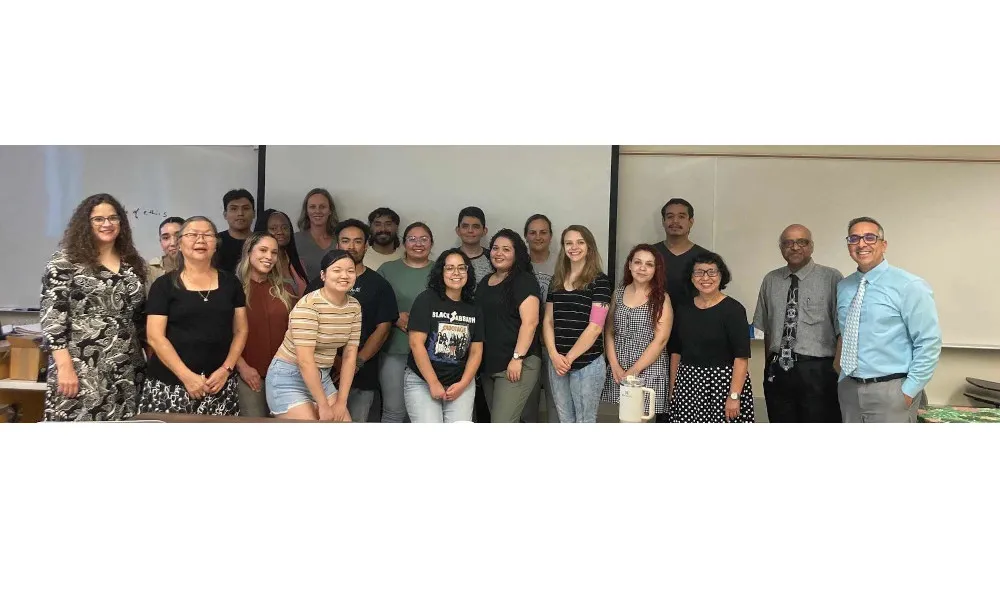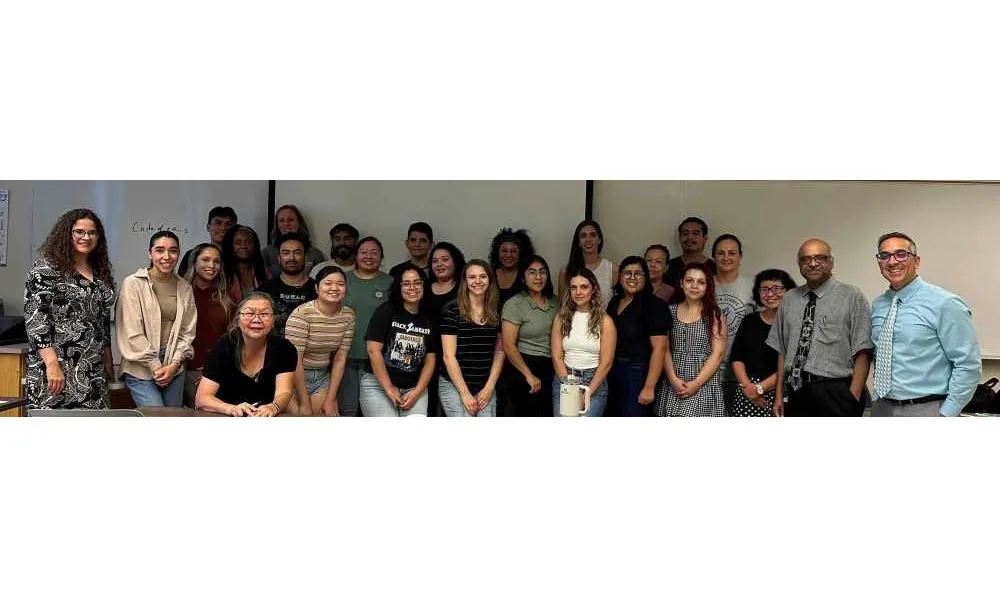Welcome


The MSNS degree prepares students for careers in nutrition and related fields by developing their knowledge and skills in nutrition science, cultural competencies, and applied research methods. As part of the program, students will complete original or applied research, and write and present a thesis or a project. Only students jointly enrolled in the Individualized Supervised-Practice Pathway (ISPP) or DSH-Patton Dietetic Internship (DI) and the MS program have the option to complete a project that includes supervised-practice experience rather than a thesis. This project-based option requires students to complete the Accreditation Council for Education of Nutrition and Dietetics (ACEND) requirement of 1,000 hours of supervised-practice experience, complete an applied research project in one of the rotation sites, and present their findings.
Program director: Dr. Neal Malik
Email: Neal.Malik@csusb.edu
Minimum Prerequisites
Minimum prerequisites for the MSNS include completion of the following college-level courses with a grade of “C” or better:
| Subject | CSUSB Equivalent |
|---|---|
| General Chemistry series with lab | CHEM 2050 & 2050L |
| Organic and biochemistry series with lab | CHEM 2060 & 2060L |
| Nutritional Biochemistry | e.g., HSCI 4661 |
| Anatomy & Physiology with lab | BIOL 2230 & 2240 |
| Statistics | MATH 1201 or HSCI 3205 |
| Fundamentals of Human Nutrition* | HSCI 3601 |
*Exposure to life cycle nutrition is highly recommended.
Most students with a Bachelor of Science in Nutrition degree will meet the prerequisite requirements. You can check if courses from your institution are equivalent to these courses via the Assist website. Note that not all institutions will be included on the Assist website.
GPA Requirements
The program also requires a minimum grade point average of 3.0 (“B”) in the last 60 semester units (or 90 quarter units) of undergraduate coursework and in all post-graduate coursework.
Application Deadlines for Fall 2025
- Priority Deadline: January 31, 2026
- Application Close Date: April 30, 2026
Please use the Office of Graduate Studies for key University guidelines as a resource before applying to this program. It is highly recommended that applicants attend one of the free CSUSB Cal State Apply Graduate Application Sessions.
Start an application in three steps
Applicants must apply through Cal State Apply and ensure that all of their application material is completed and submitted.
Step 1. Begin application online at Cal State Apply.
Step 2. Add the CSUSB MSNS Application to your dashboard by selecting CSU San Bernardino, Master of Science in Nutrition Science, and the fall term you are applying for. This program only accepts applicants once per year, for a fall start.
Step 3. Once the MSNS application is set up on CSU Apply, find additional application instructions under the Program Materials. All applicants must submit the following application materials:
- Resume or Curriculum Vitae
- Contact information for three (3) references
- Statement of purpose
- Writing sample relevant to nutrition
- University transcripts
- Admissions requirements and program track form (Important: complete and upload to your Cal State Apply application)
Questions about the MSNS program and application can be directed to Dr. Malik, the MSNS Program Director: Neal.Malik@csusb.edu
Program Learning Outcomes
Master of Science in Nutrition Science graduates will:
- PLO1: Apply nutrition science knowledge and technical competencies to solve complex problems.
- PLO2: Design, analyze, interpret, and critique nutrition research.
- PLO3: Effectively communicate and defend evidence-informed ideas and recommendations regarding nutrition science across a diversity of contexts.
Student Learning Outcomes
Graduates of the Master of Science in Nutrition Science will achieve the following during the program.
- SLO1: Students will master a breadth of knowledge in nutrition science, including macronutrients, micronutrients, research methods, and cultural competencies.
- SLO2: Students will integrate nutrition knowledge and critical thinking skills to solve complex problems in nutritional science in the form of complex case studies.
- SLO3: Students will search for and critically read, evaluate, and interpret the scientific literature through group discussions and a written literature review.
- SLO4: Students will design, conduct, and present ethically sound research in the field of nutrition and accurately interpret the results and public health implications of the research, through the culminating experience of a thesis or project.
- SLO5: Students will effectively and respectfully work collaboratively in groups, and communicate professionally, both in writing and orally, in a variety of settings.
- SLO6: Students will use research findings to propose and defend decisions and recommendations for population and individual health and nutrition.
Courses are offered on Fridays, in the evenings, partially online and occasionally on Saturdays. All courses taken to satisfy the requirements for the degree must be completed with a minimum grade of B or higher, except that a course in which no letter grade is assigned. The overall grade-point-average to be in good academic standing in the MPH program is a 3.0.
A minimum of 32 semester units must be taken and passed with a minimum of a B grade to meet the requirements for the MSNS degree. The roadmap for these courses is outlined in the table below.
| Courses | Units |
|---|---|
| Year 1 - Fall | (9 units) |
| HSCI 6601 Macronutrient Biochemistry | 3 |
| HSCI 6603 Research Methods & Biostatistics in Nutrition Science | 3 |
| Elective | 3 |
| Year 1 - Spring | (9 units) |
| HSCI 6602 Micronutrient Biochemistry | 3 |
| HSCI 6653 Nutrition Assessment | 3 |
| Elective | 3 |
| Year 2 - Fall | (7 units) |
| HSCI 6973 Thesis or HSCI 6963 Project | 3 |
| HSCI 6690 Seminar | 1 |
| Elective | 3 |
| Year 2 - Spring | (7 units) |
| HSCI 6973 Thesis or HSCI 6963 Project | 3 |
| HSCI 6690 Seminar | 1 |
| Elective | 3 |
| Total Units | 32 units |
Please note: course substitutions may occur in the program.
Culminating Experience
The MSNS program requires a thesis as the culminating experience, and offers a project-based option for students concurrently enrolled in the ISPP Program.
Thesis Track
The thesis will be based on supervised original research conducted by the student with close supervision from the student’s major professor. The thesis concept (i.e., the proposed research prior to starting the work) must first be approved by the student's thesis committee, and the final thesis must be reviewed and approved by the students' thesis committee before submitting to Graduate Studies.
Project Track
The project will be based on the students’/interns’ experience while completing the ACEND required hours, typically 1,000 hours, of supervised-practice experience to complete their ISPP/DI Program training, which can be completed in 10-11 months. The interns will work closely with the ISPP Program Coordinator, preceptors, HSCI faculty, and Didactic Program in Dietetics (DPD) Director to complete the supervised-practice hours and competencies requirements including an applied research project to be conducted during a supervised-practice rotation. The applied research project proposal must be submitted and approved by the ISPP/DI Program Coordinator prior to starting the project. The research project should focus on a question or problem relevant to applied nutrition or dietetic practice. The proposal and project should include a systemic approach and application of research methodology. After completion of HSCI 6603 in the first year, interns should have some idea of a research topic and method for data collection.



